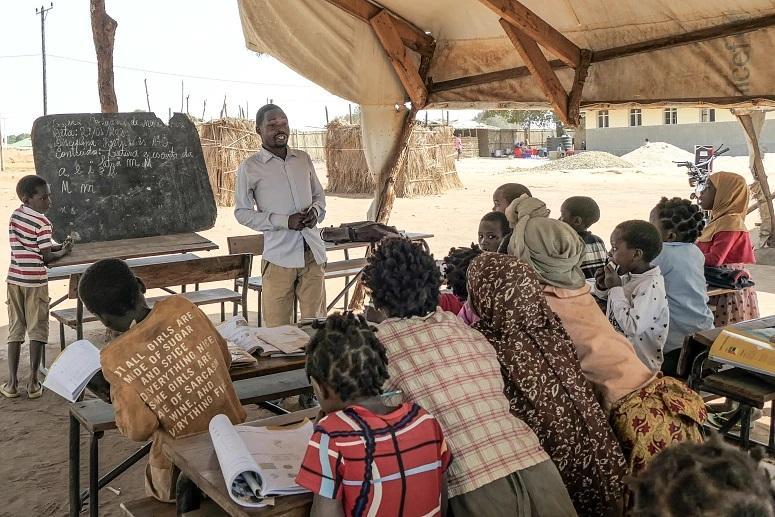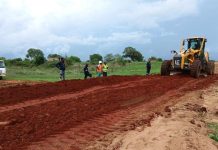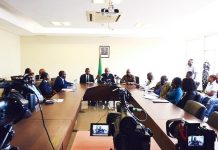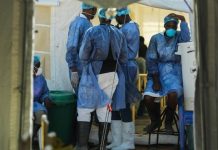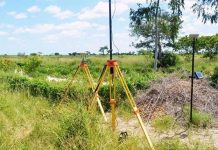Africa-Press – Mozambique. At the Marrocane reception centre for displaced people, a thousand children – orphans who fled the terrorist attacks in northern Mozambique – attend improvised classrooms in tents, where 15 teachers try to minimise their fear with music, dance and games.
“They’re scared, they lost their parents there, some lost their loved ones,” Consolata Lucas, a 28-year-old teacher, told Lusa. “Most of them are orphans: their parents were beheaded there, in Mocímboa da Praia.”
In this reception centre for displaced people, which since 2021 has been home to the Marrocane Primary School in the Ancuabe district, the teacher – in her white coat in the middle of a makeshift classroom in a tent – has 72 first-graders every morning, of different ages and from various districts of Cabo Delgado.
They have all fled their places of origin and are now trying to learn to read and write, some in tents – designated by humanitarian organisations as Temporary Learning Spaces (TLS) – pierced by the wind and heat that leave them exposed. Other classrooms have slightly better conditions, built with wood and adobe on the walls, all with a small blackboard, but equally bare.
“We motivate the students so that they can forget what they’ve experienced,” Consolata explains. “We created mechanisms or a way to concentrate the students in class. We played games, sang, danced”.
“This is a way of helping the child fit into the lesson. When we sing and dance, the children can really forget what they’ve experienced,” she goes on, before calling the children back for another one of these moments.
Consolata Lucas has been a teacher since 2021, precisely when these displaced people started arriving in her district, Ancuabe, and she never thought that she would have be teach such pupils in such conditions: “I really didn’t imagine it, but it’s our reality. It’s our reality.”
A small, broken blackboard, used by more than 70 pupils in each of the two class periods of the day, as is the case with the other classrooms, is one of the challenges, precisely in classes that are learning to read and write.
“They need visible blackboards so they can see and copy what we write,” she says, extending the list of complaints to the lack of textbooks, notebooks or uniforms – among other things.
“It’s not good,” she says. “It’s cold weather, the children are cold.”
In 2021, Cabo Delgado had around 96,000 displaced students, although the figure had fallen to 40,000 by 2023. More than 188,000 families were displaced in Cabo Delgado province, in northern Mozambique, fleeing the armed violence – which has claimed more than 4,000 lives in the last six years – for a total of more than 773,000 displaced people.
In this supposedly temporary centre, in another tent, Somar João Varrossa, 32, has 85 second-graders in his charge, all with a story of escape and drama to tell, disguised by the usual group games.
“They’re scared,” he said. “A small noise is something of a threat… There are more children who have lost their parents – orphans of both mum and dad, or just one of them.”
A teacher for seven years, he has been in Marrocane for more than two years, at the makeshift school in this displacement centre where hundreds of families live in huts or other wooden and adobe constructions.
Somar stresses the difficult conditions in which these children try to learn.
“We create songs to see if they forget what they’ve been through, try to disguise their memory by singing, playing little games,” he says. “Football and also traditional local games… It helps a little, it makes them forget what they’ve lived through.”
Somar João Varrossa was also the first teacher at Marrocane, where he arrived in 2021: “The school started with us.
“Other schools have decent classrooms, we still don’t,” he notes.
Today, these 15 teachers are enrolling 1,010 children door to door in the centre, even though there is little to offer in these classrooms.
“The conditions are precarious, as it’s very windy today, so the work isn’t encouraging, and the children aren’t receiving their lessons in a dignified manner,” he says.
Even so, the offer of a hot school lunch every shift helps to curb student absenteeism: “Because of this, the children turn up at school because they have something to eat.”
On a day when the children at the reception centre received school materials donated by the Millennium BIM bank in conjunction with Portuguese non-governmental organisation Helpo, Gonçalves Negungoa, 39, is trying to attract attention to reading and writing the letter m, amid the strong wind that is felt in other tents and which constantly blows down what’s left of the board.
Even so, he assures us that “the children are understanding”.
A teacher for 15 years, he has 60 students in the first class on the morning shift and has been at the school since 2021. As well as being a teacher, he himself is a displaced person, having fled Macomia, another district of Cabo Delgado hit by terrorist attacks.
He says it is out of the question for him to return to what was his home, from where he escaped on foot with his wife and six children: “I’m never going back. I’m staying here for good.”
In the centre of Marrocane, his wife has since given birth to his seventh child, but he still can’t forget the moment he left.
“We fled at night and walked through the woods for a week,” he says.
As for the students – most of whom are poorly clothed and have textbooks that are almost illegible and torn, without pencils or pens – he recognises that the lack of uniforms is just one of the many daily difficulties.
“Some of them have lost their possessions,” he explains, as the board falls over again, only to be picked up by the children, laughing.
“They need more notebooks, books and some school materials,” he says – not to mention, of course, a new blackboard.
However, teacher and displaced person Gonçalves Negungoa can easily identify the greatest need for these children: “It’s peace.”
For More News And Analysis About Mozambique Follow Africa-Press

